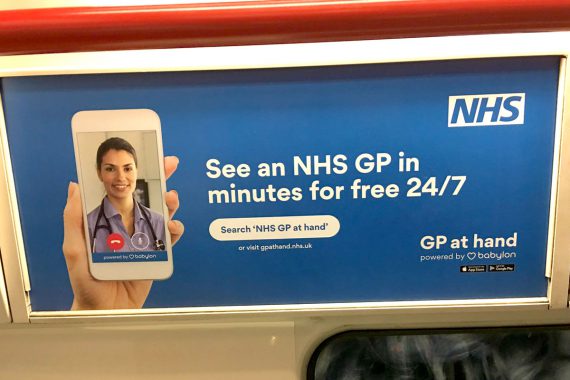GP at Hand patient list increases by 3,200 in a month after advertising campaign

Patient numbers at the digital-first Babylon GP at Hand practice have surged over the past month following a London-wide advertising campaign by the service, local CCG board papers have revealed.
The latest NHS Hammersmith and Fulham CCG board papers, published today, said the NHS practice’s patient list increased by 3,200 from January to February – which the CCG told Pulse brought it to a total of 44,565.
Today’s papers claimed the rise in the number of patients was ‘the largest increase in 2018/19’ for the practice and that it represented around 5% of the national growth in all practice list sizes over the month.
But GP leaders have stressed other practices do not have access to the same resources as Babylon GP at Hand, which meant it was ‘not a level playing field’.
The CCG papers said: ‘The GP at Hand practice has been very active recently with an advertising campaign across London and the list increase of 3,200 from January to February is the largest increase in 2018/19 and 50% above the monthly average [for GP at Hand] for this year.
‘This monthly increase is also equivalent to [around] 5% of the entire national list size growth of 64,000 for the same period.’
The CCG board papers added that Babylon GP at Hand’s planned expansion to Birmingham – which was given the green light by NHS England last month – meant that ‘substantial further list growth and cost pressures’ on the CCG are ‘now much more probable’.
The CCG has previously warned it might not be able to ‘pay its bills’, due to financial pressures caused by tens of thousands of patients signing up to service.
Lancashire GP Dr David Wrigley, who is also BMA Council deputy chair, told Pulse the increase in the practice’s patient list size highlighted the difference in investment available to the Babylon-backed service, compared with NHS practices.
He said: ‘Patients have chosen to move to GP at Hand, but it’s not a level playing field where each surgery has the same resources, such as for advertising campaigns.
‘It’s very important that NHS England takes note of this and ensures that every practice has the opportunity to provide a good service to all their patients.
‘The main issue is that this service is utilising the regulations to operate in a different way, which is to the detriment of other practices, who lose funding.’
Londonwide LMCs chief executive Dr Michelle Drage added: ’GPs have always been at the forefront of technological change and have been years ahead the rest of the NHS in many areas.
‘But there is a need to test and prove the concept and reliability of new technology before scaling up the offer – particularly in light of the severely limited funds available to GPs to meet the needs of all patients who depend on their services.
‘We hope that the Ipsos Mori independent evaluation of GP at Hand, which is due to report imminently, will address our concerns.’
A spokesperson for Babylon Health said: ’The NHS was founded on the premise that patients should be able to choose their doctor. Tens of thousands of Londoners are choosing Babylon GP at Hand because as well as offering the physical consultations that other practices offer, patients can have a video or phone consultation 24 hours a day, 365 days of the year.
‘There will always be patients who choose or need physical appointments and we must ensure this is an option, but as the NHS long-term plan shows, there is a demand and a need for digital consultations and more practices need to start offering them. We are all funded in the same way by the NHS, the question is what value can we offer our patients.’
Babylon launched its online service for NHS patients in 2017 by partnering with a practice in west London, now known as Babylon GP at Hand – and Pulse has previously reported on its steady increase in patient list size.
An independent evaulation of the service is currently being conducted by Ipsos Mori, while the CQC is assessing whether the app has destabilised other GP practices, and its impact on the overall quality of care.
Pulse July survey
Take our July 2025 survey to potentially win £1.000 worth of tokens











